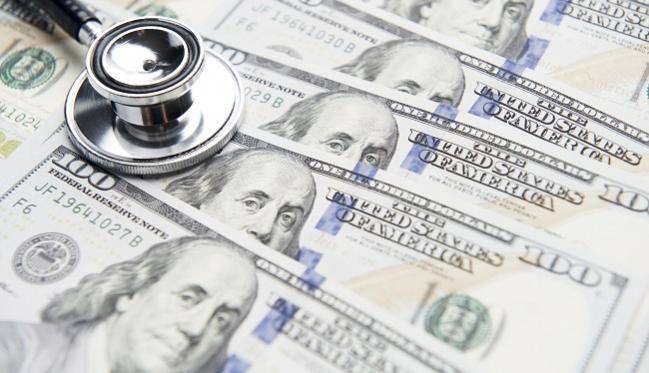Money-Back Guarantee for Evolocumab Has Little Impact on Cost-Effectiveness
Best-case scenario: it would cost $1.6 million to prevent one MI and $5 million to prevent one stroke with the PCSK9 inhibitor, a new analysis suggests.

Even if evolocumab (Repatha, Amgen) is steeply discounted, and even if the company reimburses payers the cost of the drug if patients have a stroke or MI while on treatment, the new PCSK9 inhibitor is still overpriced, according to the conclusions of a new analysis.
With these best-case assumptions, the use of evolocumab would cost more than $1.6 million to prevent one MI and nearly $5 million to prevent one stroke.
“I think it’s an important point worth making—the drug is effective, but it isn’t cost-effective,” Inmaculada Hernandez, PhD (University of Pittsburgh, PA), told TCTMD. “I’m not saying evolocumab shouldn’t be used, but for the value it brings, it should be cheaper.”
Evolocumab and alirocumab (Praluent, Sanofi/Regeneron) both lower LDL cholesterol levels and cost approximately $14,000 annually—a price that’s generated a lot of controversy and criticism. Recent studies have suggested neither evolocumab nor alirocumab are cost-effective at this price, with one analysis suggesting the drugs would only be worth the cost if the price was slashed to no more than $4,500 per year.
The nonprofit Institute for Clinical Economic Review recommends a more drastic reduction, suggesting an annual price of approximately $2,500 in the secondary-prevention setting.
Even in Best-Case Scenario, Still Too Pricey?
In March, investigators presented results from the large FOURIER trial showing that use of evolocumab reduced the risk of cardiovascular death, MI, stroke, hospitalization for unstable angina, or coronary revascularization—the study’s primary endpoint—by 15% when compared with placebo. The risks of MI and stroke were reduced 27% and 21%, respectively.
Hernandez, the sole author of the new analysis published online August 7, 2017, in JAMA Internal Medicine, said FOURIER was a somewhat disappointing trial—“underwhelming” was how one expert described feeling when the results were first presented at the American College of Cardiology 2017 Scientific Sessions. Some had hoped the large reduction in LDL cholesterol achieved with the PCSK9 inhibitor might translate into a 30% or more reduction in clinical events.
Given the cost of evolocumab, and the lukewarm response to FOURIER, this spring Amgen announced plans to negotiate a money-back guarantee with payers in which the company would rebate the cost of evolocumab if the patient has an MI or stroke while taking the PCSK9 inhibitor. In her analysis, Hernandez estimated the cost of evolocumab under the outcome-based contract proposed by Amgen.
Basing her calculation on the rates of MI and stroke in FOURIER, Hernandez said if the rebate contracts were applied to a population comparable to FOURIER, payers would refund the cost of evolocumab in 2.15% of patients, a refund that would be the equivalent of a price reduction across all patients. Assuming a 30% to 35% industry discount to large payers, the $14,000 annual cost of evolocumab would be reduced to $9,100. Applying the 2.15% price reduction rebate, the cost of evolocumab would be further reduced to a price in the range of $8,904 to $9,061, depending on the length of therapy.
If the evolocumab refund promise is extended for 15 years, which is based on the average life expectancy of patients in FOURIER, the cost to prevent one MI and stroke is $1.61 and $4.82 million, respectively. If the refunds were limited to the first 3 years of treatment only, the cost to prevent one MI and stroke is $1.64 and $4.91 million, respectively.
Amgen Disputes the Findings
For their part, Amgen disputed the numbers, noting that the applied industry discount is estimated using statements made in the media while the estimated outcomes-based rebate is based on MI and stroke event rates from FOURIER. Event rates in clinical trials are substantially lower than real-world events, according to an Amgen spokesperson, which wouldn’t reflect the full discounted refund available to payers.
“Given the stakes for patients, we believe any value assessments should aim to achieve the highest level of transparency, strive for very broad stakeholder engagement, and place scientific rigor and patient interests at the center of the analysis,” according to Amgen. “We remain concerned that these types of assessments are focused on ringing alarm bells from a payer perspective, rather than focusing on a rigorous analysis that fully reflects the patient perspective of value.”
The company said they are working with researchers to publish further economic analyses based on FOURIER, as well as analyses of cost-effectiveness in real-world patients with cardiovascular disease.
To TCTMD, Hernandez said that while it looks good for marketing purposes to offer this sort of guarantee for evolocumab-treated patients, the 2% reduction in price doesn’t come close to making the LDL cholesterol-lowering agent cost-effective. “It’s not something that’s going to mitigate the fact that these drugs are too expensive for the value they bring,” said Hernandez.
She added that the analysis is as favorable to Amgen as possible, but even under the best-case scenario, evolocumab is still at least twice as expensive as it should be.
Hernandez noted that cost evaluations are controversial, particularly since some patients or physicians might think they will lead to barriers to treatment. That said, “when we talk about prices and cost-effectiveness in healthcare, we need to understand that money is not infinite,” said Hernandez. “If we really want to cover everything that’s coming out, regardless of the price, we may end up in a situation where healthcare is even more unaffordable.”
Michael O’Riordan is the Managing Editor for TCTMD. He completed his undergraduate degrees at Queen’s University in Kingston, ON, and…
Read Full BioSources
Hernandez I. Revisiting outcomes-based pricing propositions for the PCSK9 inhibitor evolocumab. JAMA Intern Med. 2017;Epub ahead of print.
Disclosures
- Hernandez reports no conflicts of interest.


Comments